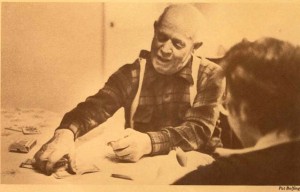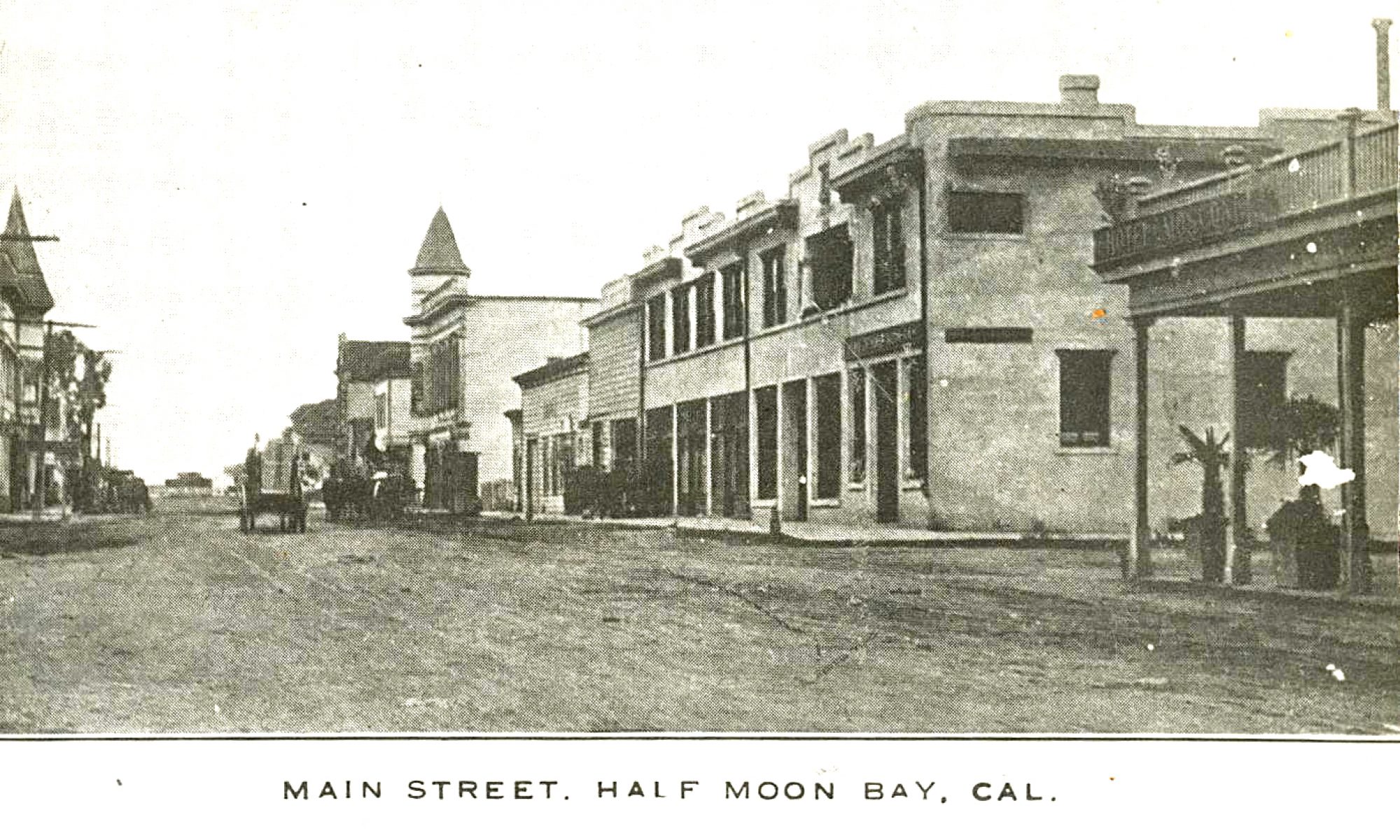Note: In 1977 “Transitions: Montara to Pescadero An Oral History” was edited by Aida Hinjosa and published by Canada College.
Shorty Berta: Man of the Earth
By Michael Silver
 (Image of Mr. Shorty Berta by photographer Pat Bolfing.)
(Image of Mr. Shorty Berta by photographer Pat Bolfing.)
“…while Berta works his farm in vegetables and
salt air as he’s done each spring for fifty seasons,
last of the old time truck farmers
Last of the good green growers,
looking like a dream in his field—
a farmer, a man of the earth,
a seed planting seeds….
from ‘Evening Drive’ by Ron Federighi
You can usually see him working around his truck farm when you drive on Highway 92 into Half Moon Bay. Sometimes he is working in the stand selling the vegetables he has grown. Most often, he is in the fields. Occasionally, you can see him atop the tractor he calls ‘capterpillar.’ He still works very hard aside from the fact that he believes he has become lazy, waking up at 7 a.m. to start his day. He is usually dressed the same: work pants, flannel shirt, suspenders and rubber boots with lots of dirt from hard work thrown in. All these facts seem unimportant unless you know that Guiseppe is eighty-seven-years-old.
No one knows him as Giuseppe. He is Shorty to his many friends. His face is wrinkled and his hair sparse, but his eyes have the glow of eternal youth. He has a sly sense of humor and his keen wit was ever-present as he related to us the experiences of his life.
As we entered the Berta’s small, spotless home, Shorty was seated at the table shuffling a deck of cards. He asked us if we would like to play with him and how much money we had to lose. We agreed to play at a later date. He moved into the small, comfortable living room and sat back in his recliner.
We were nervous on this, our first interview, but once he began talking, things naturally fell into place. He spoke mostly of past days with his sly sense of humor and no remorse.
“I been in California since nineteen fo’teen. I came to dis country, I was twenty fo’ years old.
“I was a farmer back dere in in Italia too. My father was a farmer too. And when I came hea’ I thought I could make mo’ money to go aroun’ work in a mine, logging camp, stuff like dat. I try try six yea’. I go aroun’ work fo’ years in de mine.
“Den I go, ah, in a farm. I peek grape by de ton, we go make mo’ money. But den afta six yea’ was still broke. I say, ‘My God, I’m gonna buy a farm’
“I went over der to Moss Beach. I buy stock ova der in a truck farm. I work fo’ yea’ ova der. Den we’re gonna make good, an’ de boss, he steal all. He keep all fo’ himself. I stay der from nineteen twenny to nineteen twenny to nineteen twenny fo’. Den I start a argument. I sell out. I say, ‘I need a rest. I’m gonna be de boss, an’ nobody’s ticket.’ Den, I rent dis place, for twenny five yea. Den in nineteen fo-ty eight, I got married. Den I buy fo’teen acre.”
Shorty’s conversation included much talk of the old days and what it was like working on a ranch during his first few years in this country.
“At dat time you work in a ranch, a dolla’-a-day. Dey pay your room an’ board, but dey put you to sleep in de, ah, stable, in a bunkhouse. My doggie has better place now den I had back den. We hadda work an’ go to de bathroom outside. We had no electric. Dey give you a lamp, Dey give you a lamp, you put in light fuel, but I like it.
“First place I work was in Stro’berry Lake. I work der’ fo’ two an’ a half days. We work pretty hard, but when I go eat, son of a gun! Der was a steak dat long. (He indicates two feet with his hands.) I thought it was a sin to get mo’, maybe dey come afta’ me, der be none in the mo’ning. I hadda friend of mine, he was in dis country about a yea’, an’ he says, ‘Sit down, get it off.’ (He whispers animatedly.) An’ when we eat dat steak, de guy, de cook, he still bring mo’. An’ in de’ mo’ning, he bring de ham an’ eggs, you know. Big piece of ham, an’ he put it on a big table we had, an’ some people, dey take half a dozen eggs. Dey eat like der was no end, an’ den when det was no mo’, he go an’ fill the plate up.
“But sleep, sleep was bad. For sleep, we had de bunkhouse. You know, one guy, he sleeps here and the other guy, he sleep above, three full. But we had jus’a two-inch board. No mattress, no nothing. We just had one blanket, yeah, an’ dose boards were jus’ like dey come from de mill. We got chinks (splinters). Yeah! I don’ care to sleep dat way.
“You have no cold ’cause dey have big stove, you know, an’ all kinds of wood, an’ we put wood in der too. But in November it started to rain, an’ den we had to quit. But it was all right for eat. Boy, it was all right.”
We kidded Shorty about his interest in food and his desire for life’s little luxuries.
“I like now betta. When I come hea’ we have no inside bathroom. Shower–for shower you had to take outside. I like now.
“When I come to dis country, I like right away. When I land in New Yo’k to San Francisco. It take seven day at dat time, but, ah, in Italy I put in two yea’ service in de army an’ was on de train every day. But in dat train, de seat was a two by fo’, you know,. When I land in New Yo’k, I take de train to San Francisco, the seat was like a centipede. The night car man, he had a big pile of–what you call? Pillows, nice an’ clean. An, he give you, everybody a pillow an’ you sleep betta’ den baby. I like. Den I fin’ de steak mo’ big. Back in Italy, was a steak about dat big and dat long. (He indicates about two inches in thickness and three inches in length.) But ova’ hea’, Jeesus Christ! De steak was like dis! (He indicates two feet in length.) Dey got a pretty good size steak. You be su’prised.”
We asked Shorty if he liked life today better than when he was younger.
“I liked some t’ings betta’ in my day. But, ah, de other t’ings mo’bett’ now. De money, befo’ you make a dolla-a-day. But, den today people have mo’ of de money and dey got mo’ money to spend.
“I remember when I was young. I was by myself at de time. I would go to San Francisco. Den, I go down with twenny dolla’. I stay three, fo’ day, eat an’ sleep, go to dance, an’ take some money home, too.
“Now, I go into the city, me an’ my wife, with twenny dolla’. We go eat, der just enough for one meal.
“When I come to dis country, I have an Italian suit. I was flat broke. I din’ have two cents in my pocket. Den one day, when I make thirty dolla’, I buy myself a new suit, shoes, an’ a shirt for thirty dolla’. Now fo’ the thirty dolla’, you couldn’t buy nothing. Just las’ yea’ I wen’ down an’ bought a coat. Jus’ a big coat, an’ it cos’ me eighty dolla’.
“One t’ing I don’ like. Da people befo’ dey was mo’ friendly. Like mo’ one another. Yeah, mo’ like a family. Da people den was mo’ friendly. Like in a ranch. You have New Year an’ Easta’ Sunday, an stuff like dat, an’ we come togetha’ an’ eat, an’ den we stay all day togetha’. We hadda guy, he hadda accordion an’ we had music, an’ we dance all day. We sing. We drink wine.
Continue reading “HMB Heart & Soul: Shorty Berta: Man of the Earth”
